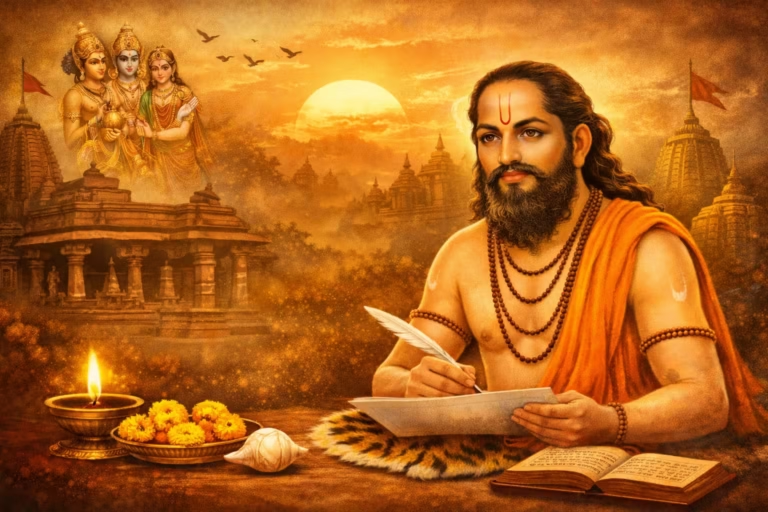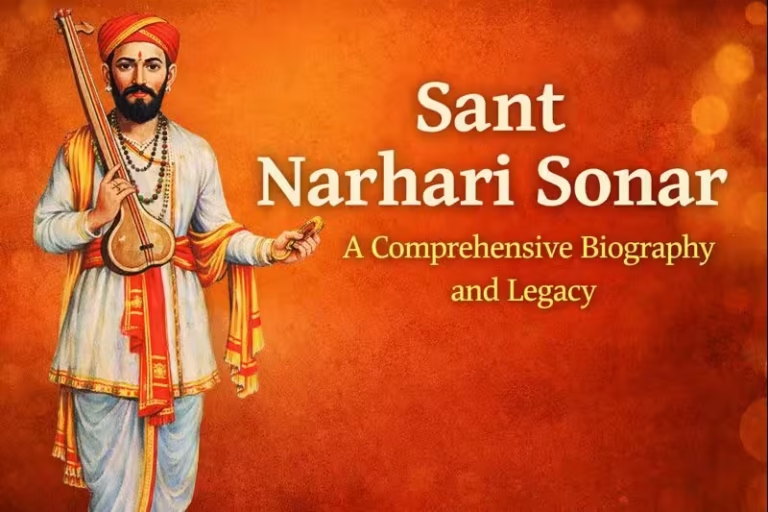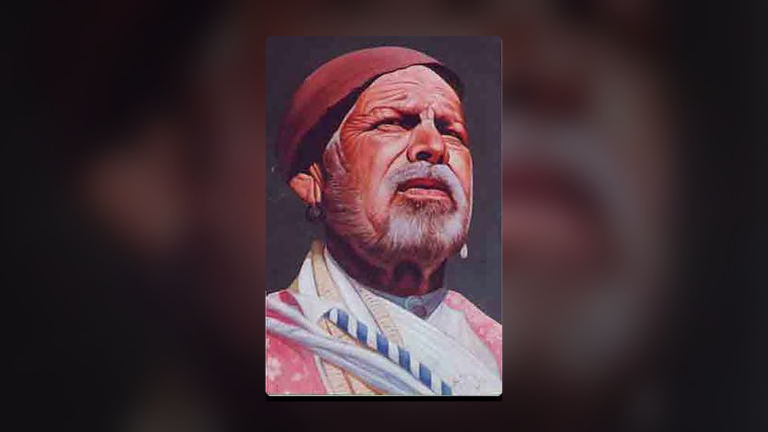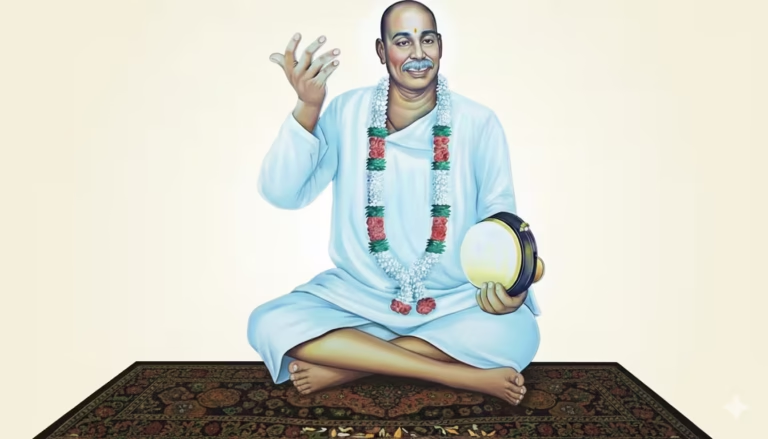Sant Guru Ravidas was a great saint, poet, and social reformer of the Bhakti movement. He was active in North India during the 15th-16th centuries. He raised his voice against caste discrimination, untouchability, and injustice prevalent in society. His teachings and hymns spread the message of unity and brotherhood.

Table of Contents
Life Overview of Sant Guru Ravidas
Birth and Family
It is believed that Guru Ravidas was born between 1377 and 1399 in Varanasi (Kashi). However, there are different opinions regarding his birth date and mother’s name. He belonged to the Chamar (leatherworker) community. His father’s name is mentioned as Santokh Das, and his mother’s name as Karma Devi, though some sources provide different names. During his birth, caste discrimination and untouchability were deeply rooted in society.
Childhood and Education
From childhood, Guru Ravidas had an inclination toward spirituality and the company of saints. His parents provided him with an opportunity for education, but he faced many difficulties due to social discrimination. Despite this, he continued acquiring knowledge and gained spiritual wisdom through his experiences.
Bhakti and Saint Tradition
Guru Ravidas was a follower of the Nirguna Bhakti tradition. He was a contemporary of Sant Kabir, and their teachings had many similarities. He opposed idol worship and promoted devotion based on remembering God’s name, truth, love, and compassion. He taught that God is equal for everyone and not confined to any caste, religion, or class.
Key Teachings and Philosophy
Guru Ravidas’ teachings emphasized equality, love, devotion, and social justice. Some of his core ideas include:
- Universal Equality: Every person is equal, and no one should be discriminated against based on caste, religion, or social status.
- Importance of Name Remembrance: Worshipping God does not require idol worship; instead, remembering God’s name and selfless devotion are essential.
- Value of Hard Work: Hard work and honesty are the highest forms of worship.
- Morality and Truth: One should always follow the path of truth, morality, and righteousness.
- Vision of Begumpura: He envisioned an ideal state called ‘Begumpura,’ where there would be no sorrow, injustice, or poverty.
Guru Ravidas’ Literature and Works
Guru Ravidas composed many devotional hymns, couplets (dohas), and abhangas. Some of his compositions are included in the Guru Granth Sahib, which grants him a significant place in Sikhism. His poetry carries the message of social equality, humanity, and devotion.
Famous Couplets:
👉 “Man Changa To Kathoti Mein Ganga.” ✅ Meaning: If the mind is pure, then there is no need for specific religious rituals. The purity of heart is enough to attain closeness to God.
👉 “Aisa Chahun Raj Mein, Jahan Mile Sabanko Ann. Chhot Bado Sab Sang Base, Raidas Rahe Prasann.” ✅ Meaning: An ideal state should be one where everyone gets food, and people of all statuses live together happily without discrimination.
Impact on Society and Legacy
Guru Ravidas’ influence can be seen in Punjab, Uttar Pradesh, Rajasthan, Maharashtra, and Madhya Pradesh. His followers are known as ‘Ravidasia.’ His hymns are included in the Guru Granth Sahib, with over 40 verses attributed to him.
Death
It is believed that Guru Ravidas passed away in 1528. His teachings continue to inspire millions even today.
Characteristics of Guru Ravidas’ Couplets
His couplets are simple yet profound, filled with deep philosophy. Some key features include:
- Message of Social Equality: Strong opposition to the caste system and discrimination.
- Emphasis on Name Remembrance: He prioritized devotion through the remembrance of God’s name.
- Vision of an Ideal Society: His concept of ‘Begumpura’ presented a society based on equality.
- Importance of Hard Work: He valued honest labor as the highest virtue.
- Simplicity and Morality: He emphasized a simple and ethical way of living.
Guru Ravidas’ Couplets and Their Meanings
👉 “Man Changa To Kathoti Mein Ganga.” ✅ Meaning: If the mind is pure, external rituals like pilgrimage are unnecessary. Inner purity is more important than physical rituals.
👉 “Jaat Paat Ke Pher Mein, Uljhi Rahi Gaya Sansar. Yeh Basti Hari Naam Bin, Rahi Na Eku Baar.” ✅ Meaning: The world remains entangled in caste and class conflicts, but the truth is that without remembering God, society cannot survive.
👉 “Aisa Chahun Raj Mein, Jahan Mile Sabanko Ann.” ✅ Meaning: He envisioned a society where everyone receives food, justice, and equal opportunities without discrimination.
👉 “Hari Ke Sang Base Baikuntha, Daras Paras Binse Dukh Punth.” ✅ Meaning: A person who is devoted to God resides in true heaven, where all sorrows disappear.
👉 “Karma Bhoomi Par Phal Sab Kahu, Vidhi Ke Lekh Mite Na Rahu.” ✅ Meaning: One receives rewards based on their deeds, and destiny’s script cannot be erased.
👉 “Jo Binu Guru Ke Jaane, So Matihin Ajaan.” ✅ Meaning: Without the guidance of a guru, knowledge remains incomplete, like a donkey unaware of the value of the grass it eats.
👉 “Ram naam jap lijiye, chhoote sab upadrav. Sant sang jab paiye, mite sakal kuharav.” ✅ Meaning: Chanting the name of Lord Ram removes all troubles and difficulties. Being in the company of saints eradicates ignorance.
👉 “Jati jati mein jati hai, jo ketan ke paat. Raidas manush na jud sake, jab tak jati na jaat.” ✅ Meaning: Caste discrimination is like the leaves of a tree—each leaf appears different, but the root is the same. Humanity cannot unite until caste distinctions are abolished.
Through his couplets, Guru Ravidas conveyed messages of social equality, devotion to God, the significance of labor, and morality. He opposed caste discrimination, superstition, and ritualism, envisioning a society based on equality for all. His couplets continue to inspire society today and guide human life on the right path.
When is Guru Ravidas Jayanti in 2026?
Guru Ravidas Jayanti is celebrated to honor the birth anniversary of Sant Guru Ravidas. This festival is observed on Magh Purnima (Full Moon Day in the month of Magh) with great devotion. In 2026, Guru Ravidas Jayanti falls on 1st February 2026. His teachings and thoughts brought significant social change, making his birth anniversary a day of reflection and celebration.
Importance of Guru Ravidas Jayanti
This day is not just an occasion of festivity but a moment to recall his teachings and promote social equality. His followers organize discussions, devotional gatherings, and social service activities.
Date and Significance According to Panchang
Guru Ravidas was born on Magh Purnima, so his birth anniversary is observed accordingly. The Gregorian calendar date varies yearly, but the festival generally falls in February.
Celebrations and Traditions
- Grand Processions (Nagar Kirtan): Massive processions are held in cities like Varanasi, Amritsar, Delhi, Mumbai, and Punjab.
- Discourses and Satsangs: Religious sermons and recitations of his teachings are conducted.
- Special Worship and Devotional Music: Temples dedicated to Guru Ravidas organize prayers, hymns, and devotional gatherings.
- Special Celebrations at ‘Shri Guru Ravidas Janmasthali’ in Amritsar: Thousands of devotees visit this sacred site to celebrate his birth anniversary.
- Community Feasts and Charitable Activities: Many places host free food distribution (langar) and social welfare programs.
Special Aspects of Guru Ravidas Jayanti
Message Against Caste Discrimination and Untouchability: The primary objective of Guru Ravidas Jayanti is to promote social equality.
Importance of Hard Work: Guru Ravidas emphasized that labor is the highest form of dharma (righteous duty).
Significance of Name Remembrance: In the path of devotion, remembering God’s name holds special importance.
Following the Saint Tradition: On this day, saints and devotees gather for special discourses and discussions on Guru Ravidas’ teachings.
How Guru Ravidas Jayanti is Celebrated in India and Abroad
- In India:
- Grand celebrations take place in Uttar Pradesh, Punjab, Maharashtra, Rajasthan, and Madhya Pradesh.
- Thousands of devotees visit the Guru Ravidas Janmasthali (birthplace) in Varanasi.
- Large processions are held in Amritsar and Delhi.
- Abroad:
- Guru Ravidas Jayanti is celebrated with great devotion outside India as well, especially in Canada, the USA, the UK, and Germany.
- The Punjabi and Ravidasia communities enthusiastically participate in the celebrations.
Impact of Guru Ravidas Jayanti on Society
The greatest impact of Guru Ravidas Jayanti is the spread of messages of social equality, love, and tolerance. His teachings have inspired numerous social reformers and thinkers. His philosophy is not limited to one community but serves as inspiration for all of humanity.
Guru Ravidas’ Thoughts
Guru Ravidas presented many valuable thoughts for society, which remain relevant for social reform even today. Some of his key teachings include:
Social Equality: Guru Ravidas opposed caste discrimination and untouchability. He preached that every individual is a part of God and deserves equal rights.
Importance of Hard Work: He emphasized that labor and honesty are of utmost importance. His message was, “Karma is the highest dharma.”
Significance of Name Remembrance: Guru Ravidas placed great emphasis on devotion and the remembrance of God’s name. His hymns highlight the importance of ‘Ram Naam’ and ‘Hari Kirtan.’
Contentment and Simplicity: He lived a very simple life and encouraged others to adopt simplicity. He advocated for a life free from materialism and ego.
Truth and Justice: Guru Ravidas raised his voice against injustice and declared that one who walks the path of truth can never be defeated.
Guru Ravidas’ Hymns
Guru Ravidas composed many beautiful hymns that convey messages of devotion and social awareness. Some of his famous hymns include:
“Prabhu Ji, Tum Chandan Hum Pani” – This hymn highlights the inseparable bond between God and the devotee.
“Avdhoo, Aisa Gyaan Bichar” – This hymn emphasizes the importance of self-realization and spiritual knowledge.
“Man Changa To Kathoti Mein Ganga” – In this famous hymn, he states that if the mind is pure, there is no need for external religious rituals.
Guru Ravidas’ hymns are still sung in gurdwaras and devotional congregations and remain an essential part of saint literature.
Guru Ravidas’ Temples
Many temples and pilgrimage sites have been established in the name of Guru Ravidas. Some of the prominent locations include:
Shri Guru Ravidas Janmasthali Temple, Varanasi This temple is built at the birthplace of Guru Ravidas. Every year, a large number of devotees visit this site for darshan and worship.
Gurudwara Shri Guru Ravidas, Amritsar This gurudwara hosts discourses and congregations dedicated to the teachings of Guru Ravidas.
Temples in Delhi, Punjab, Madhya Pradesh, and Maharashtra Several temples and ashrams dedicated to Guru Ravidas have been established across different parts of India, especially in Delhi, Punjab, Madhya Pradesh, and Maharashtra.
Guru Ravidas’ Contributions
Guru Ravidas made significant contributions to society, bringing about positive change in Indian society.
Attack on the Caste System: He openly opposed untouchability and caste discrimination. He made great efforts to unite people of all castes.
Equal Rights for Women: Guru Ravidas advocated for women’s education and their equal place in the path of devotion.
Contribution to the Saint Tradition: He collaborated with Bhakti saints like Sant Tukaram and Sant Namdev to spread the message of equality and devotion.
Social Justice: He envisioned an ideal, imaginary state called “Begumpura,” where all people would be equal, and there would be no injustice.
Guru Ravidas’ Teachings
Guru Ravidas’ key teachings include:
Every Person is Equal: He rejected caste, religion, and social discrimination, emphasizing equality for all human beings.
Devotion to God and Name Remembrance: According to him, devotion to God and remembering His name should be the ultimate goal of life.
Karma is True Worship: He believed that hard work and honesty in one’s duties are the highest forms of worship.
Truth and Justice: He always stood for truth and justice, raising his voice against any form of injustice.
Guru Ravidas’ Followers
Guru Ravidas’ followers are spread across India and abroad. The major communities that follow him include:
Ravidasia Community: His followers in Punjab, Haryana, Uttar Pradesh, and Maharashtra are known as ‘Ravidasia.’
Influence in Sikhism: Guru Granth Sahib contains more than 40 couplets and hymns composed by Guru Ravidas.
Followers Abroad: His devotees are also present in large numbers in England, Canada, the USA, and Germany.
Guru Ravidas’ Literature
Guru Ravidas composed numerous hymns, verses, and couplets, which have been compiled by his followers. Some of the major works include:
Contributions to Guru Granth Sahib: More than 40 of his hymns and couplets are included in the sacred text of Sikhism.
‘Ravidas Ramayan’ and ‘Ravidas Ki Vani’: His followers compiled his teachings and thoughts into these texts.
Name Remembrance and Hymn Collections: His hymns are still sung in temples and devotional gatherings.
Conclusion
Guru Ravidas was not just a saint but also a great social reformer. His teachings remain relevant today, offering wisdom on devotion, equality, and justice. His hymns and couplets form an invaluable part of devotional literature, continuing to inspire countless devotees worldwide.
🙏 “Jo Binu Guru Ke Jaane, So Matihin Ajaan.” (Without a Guru, knowledge remains incomplete.)
Read this also : Sant shri Gajanan Maharaj of Shegaon: Life Journey and Prakat Din Details 2025
Read this article in Hindi : संत गुरु रविदास जयंती 2025: जीवन परिचय, भजन, विचार और समाज में योगदान



